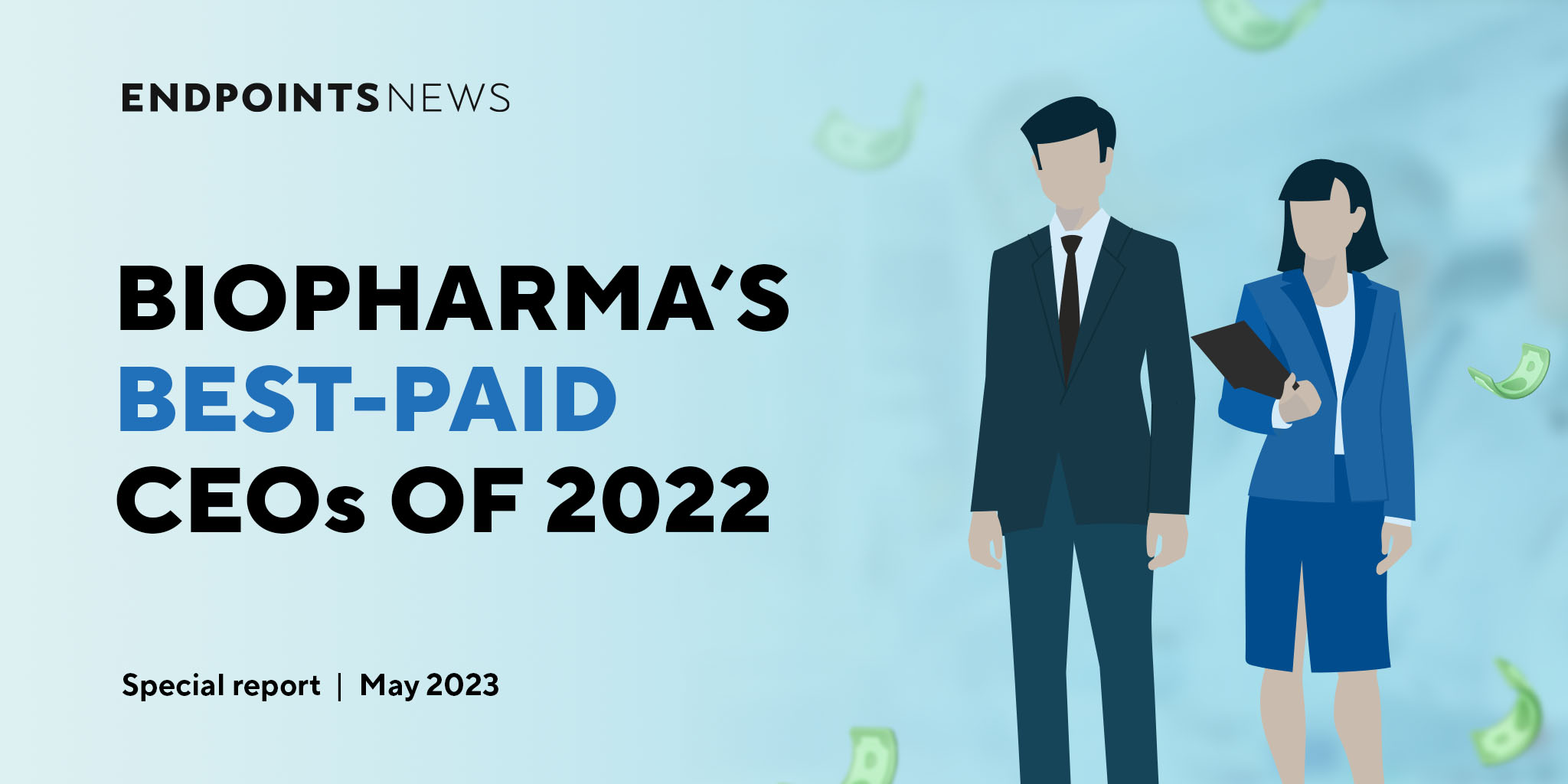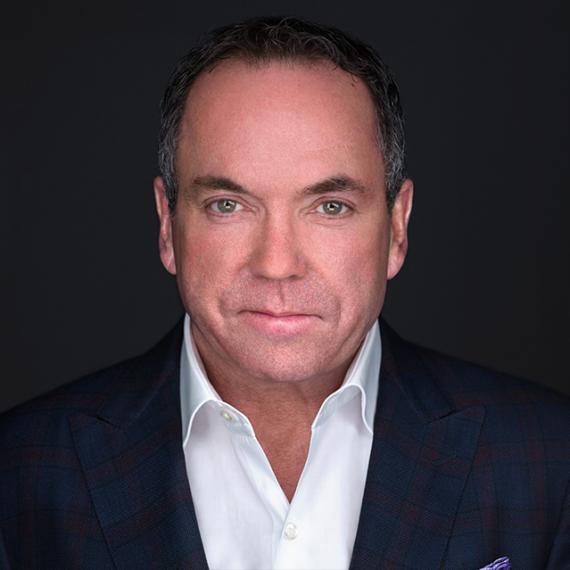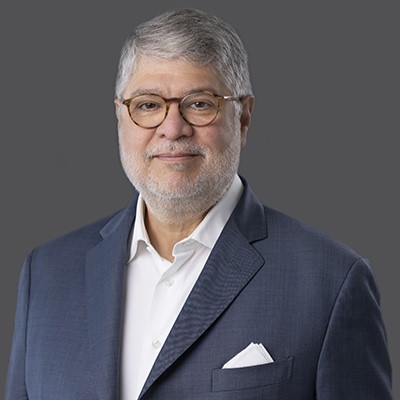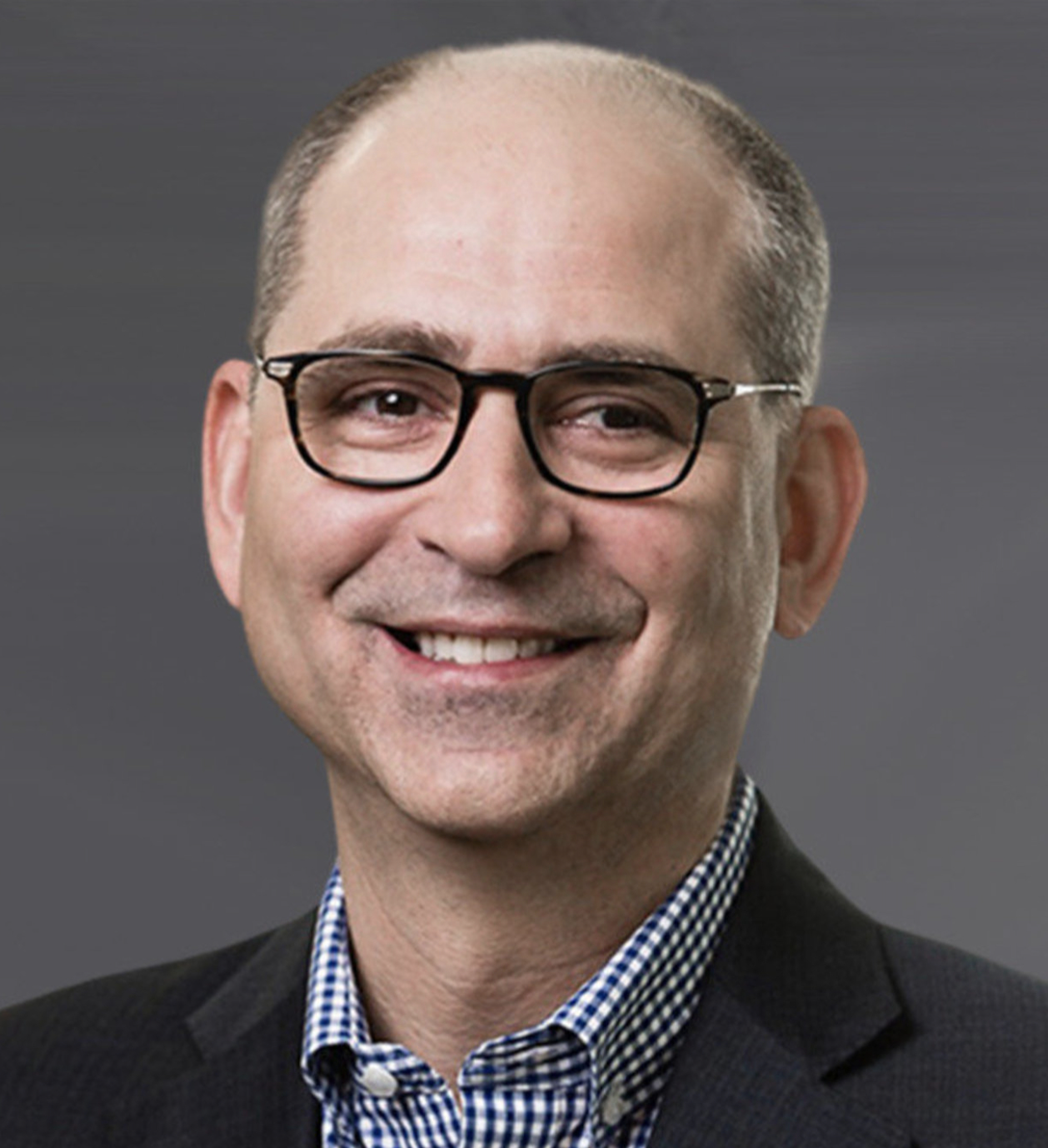
Biopharma's 20 highest-paid CEOs of 2022, each bringing in $20M+ paydays
Even in a down year for much of the biopharma market, 20 CEOs brought in pay packages valued at more than $20 million, an Endpoints News analysis found.
Endpoints collected data on more than 350 CEO compensation packages, covering a wide range of pharma, biotech, and life sciences companies. All told, the 20 largest earners made over $725 million in 2022 — an average package of $36.4 million. Three brought in paydays over $50 million, and one CEO broke the $100 million mark.
The vast majority of CEO pay packages are made up of equity instead of cash. Endpoints used the traditional measure of CEO pay for this list, considering the estimated fair value of equity packages granted or modified in the past fiscal year. This figure reflects what boards decided to pay a CEO in the last year. Many on the highest-paid list received one-time packages — either new-hire grants, retention packages, or severance — that brought their compensation up. Other methods, such as calculating the value of vested or cashed-in equity, more closely track take-home pay, but those equity awards could have been granted years ago.
The analysis also reveals how some CEOs get several bites at the apple of making life-changing money. Many receive a substantial equity package when they’re hired, and some receive similarly valuable retention packages for sticking around, and multimillion-dollar severance payouts if things don’t work out or if the company is sold.
Occasionally, pay packages draw scrutiny from investors. The legendary activist Carl Icahn has criticized Illumina CEO Francis deSouza’s payday as excessive in part of a larger battle he’s fighting with the gene-sequencing giant. Seagen has also drawn criticism from the investor advisory firm Glass Lewis for what it called “problematic” compensation practices.
Endpoints reached out to all 20 companies on the list for comment. Those that shared additional comments are noted below.
Here are 2022’s highest-paid CEOs
#1: Sarepta Therapeutics CEO Doug Ingram — $124,938,694
 Doug Ingram
Doug IngramClaiming the No. 1 spot on the 2022 list is Doug Ingram, whose pay package skyrocketed after the board changed the vesting schedule on some of his options last April. Some options were expected to expire in June 2022 and are now eligible to vest for an additional three years. The result was a massive increase in the fair present value that makes up almost all of Ingram’s compensation last year.
In its proxy, Sarepta says the change reflects Ingram’s “performance to date and the importance of retaining a valuable chief executive officer during a crucial time.” A company spokesperson added that Ingram’s salary and bonus are significantly below industry averages, with the vast majority of his pay being dependent on Sarepta’s performance.
“There are few leaders, like Mr. Ingram, who would align their personal financial interests with the overall success of the company they lead,” the spokesperson said in a statement.
The FDA is slated to soon make an approval decision on the company’s hotly debated Duchenne muscular dystrophy gene therapy. In justifying this lucrative pay package, the board also noted Ingram declined salary increases in 2018 and 2019, hasn’t sold any shares, and voluntarily bought $12 million in Sarepta stock from 2017 through 2021.
To fully realize the value of all these options, Sarepta’s stock would need to increase by at least 438%, or from $34.65 to $186.36, dating back to the original share price when Ingram became CEO in 2017. All told, Ingram could own 4.2% of Sarepta’s stock if he hits those performance goals. The board doesn’t plan to grant additional equity incentive awards in Ingram’s first eight years of employment, which is until 2025, the filing states.
#2: Royalty Pharma CEO Pablo Legorreta — $93,478,402
 Pablo Legorreta
Pablo LegorretaPablo Legorreta commands an unusual, highly profitable niche in the biopharma industry, leading a business that doesn’t develop drugs but buys up royalty rights in approved and experimental therapies.
Legorreta founded the company in 1996, and instead of receiving salary or equity awards, he’s paid “management fees” equal to 6.5% of the cash receipts from its royalty investments every quarter, along with 0.25% of the quarterly value of Royalty’s security investments. For 2022, that totaled over $93 million in cash, with about $28 million coming from Pfizer’s acquisition of Biohaven. Royalty held significant equity in Biohaven, which translated to a $479.5 million payment.
A spokesperson for Royalty added the company’s compensation committee reviews Legorreta’s performance and believes he “is performing well and the management fee paid is appropriate.”
#3: Seagen CEO David Epstein — $57,460,546
 David Epstein
David EpsteinAfter months of searching for a successor to Clay Siegall, Seagen landed a big name in biopharma in David Epstein — and paid up for the former Novartis Pharmaceuticals CEO.
Epstein’s pay package was mostly one-time equity awards, including nearly $15 million in shares that will vest over four years along with stock options valued at more than $42 million. Those options are a mix of performance- and time-based options.
Since starting last November, Epstein looks to be in for a quick, lucrative run at Seagen — at least as an independent biotech. Pfizer agreed in March to buy Seagen for $43 billion. That acquisition could accelerate the vesting timeline on some of Epstein’s equity, particularly if he leaves within 18 months following a change in control, according to his employment agreement.
“Our Board prioritized attracting one of the few leaders capable of both overseeing Seagen’s growth and commercialization strategy,” a Seagen spokesperson said in a statement.
#4: Zentalis Pharmaceuticals CEO Kimberly Blackwell — $36,614,376
 Kim Blackwell
Kim BlackwellKimberly Blackwell stands apart from most of the top-paid CEOs by leading Zentalis Pharmaceuticals, a $1.6 billion clinical-stage cancer biotech that went public in 2020. She took on the CEO role last year and most of her pay package came in stock options with a $24.41 strike price. That pay package also makes her the highest-paid woman in biotech for 2023.
A spokesperson for the company said the equity awards were substantially larger than some peers because Blackwell is a new hire, and that comparing them to CEOs who have been in the role for longer “is not an apples-to-apples comparison.”
Those options were granted last May contingent on the company’s performance, vesting only if Zentalis secured an FDA approval or there was a change in control of the company. However, the board modified the options this January to make them time-based awards instead, vesting monthly over a four-year span.
The spokesperson said the company didn’t provide commentary on this change since it happened in 2023, and the proxy filing was focused on 2022 compensation decisions. But the board “determined that this vesting change was in the best interest of the Company,” the spokesperson added.
#5: Pfizer CEO Albert Bourla — $33,017,453
 Albert Bourla
Albert BourlaWith Pfizer surpassing a record $100 billion in revenue last year, the pharma giant’s board rewarded CEO Albert Bourla handsomely. On top of his $1.74 million salary, Bourla raked in a $7.65 million bonus along with about $18 million in equity awards.
The proxy filing highlights Pfizer’s Covid-19 response and all-time revenue highs as reasons behind the compensation package.
“We believe that Dr. Bourla’s compensation is appropriate for his leadership and performance, as well as Pfizer’s outstanding overall performance in 2022, and is in alignment with Pfizer’s pay for performance philosophy,” a company spokesperson said in a statement.
#6: Former Seagen CEO Clay Siegall — $32,758,022
Despite departing as CEO last May a few weeks after being arrested over domestic violence allegations involving his then-wife, Seagen co-founder Clay Siegall brought in a $32.8 million pay package. At the time, the company said Siegall denied those claims, and Siegall did not provide a comment to Endpoints.
Most of that compensation came from a severance payout triggered by his exit. While it was publicly described as a resignation, the board treated his departure as an “involuntary termination” without cause, meaning Siegall saw some of his stock awards accelerate in vesting along with a severance package that includes 1.5 times his salary and bonus.
Siegall and the board agreed to hold any severance payouts until March 2023 to give time for the board’s investigation into the allegations. That investigation ultimately did not support termination for cause, the proxy filing states, with the board citing the fact that prosecutors declined to file criminal charges. Siegall has already landed his next gig, running the private biotech Morphimmune.
#7: 23andMe CEO Anne Wojcicki — $32,546,430
Since going public via SPAC in June 2021, the genetics specialist 23andMe has seen its stock price tumble by 80%. Despite the dismal market performance, CEO Anne Wojcicki has seen a bump in stock awards — though it’s not clear when or if she’ll be able to exercise them.
Shortly before going public, Wojcicki received restricted shares worth about $12.6 million at the time that would vest over four years. And in March 2022, she received 7.5 million shares as options with a $3.95 exercise price. Those are now underwater, with 23andMe shares trading around $2.
“Anne’s compensation is 99.8% equity, and she has never sold a single share. Her interests are strongly aligned with our shareholders,” a spokesperson said.
23andMe’s fiscal year runs from April through March.
#8: Biogen CEO Chris Viehbacher — $30,488,593
Chris Viehbacher stepped into Biogen with a massive challenge — and a proportionally sized paycheck. At the time, Michel Vounatsos had hit the exit amid the Aduhelm fiasco.
After starting in November 2022, Viehbacher received a one-time sign-on award worth about $28 million. That was a mix of options that will vest over three years and other equity awards that require Biogen to hit certain stock price and shareholder return figures.
Biogen’s proxy states that pay package “is in lieu of any other 2023 equity grants”for Viehbacher.
#9: IQVIA CEO Ari Bousbib — $30,135,029
Ari Bousbib is routinely one of the highest earners in the life sciences, running the massive drug data analysis shop since 2016. In 2017, for instance, Bousbib made $38 million — more than any other pharma or biotech CEO, according to the Wall Street Journal.
For 2022, his $30 million payday ranks in the industry’s top 10. That includes a $1.8 million salary and nearly $6 million in bonuses based on a complex formula that considers metrics like cash flow, revenue, and ESG progress. He also received stock awards worth about $16 million and options worth about $5 million.
An IQVIA spokesperson added that the board and compensation committee found Bousbib’s performance to be “exceptional,” particularly in achieving the company’s 2019 strategy to accelerate its growth following the 2016 merger of IMS Health and Quintiles that created IQVIA.
#10: Thermo Fisher Scientific CEO Marc Casper — $28,208,909
Marc Casper has led Thermo Fisher, seller of lab equipment, chemicals, and tests, for over two decades, growing the business into a $200 billion giant. Casper received a $28.2 million pay package in 2022 made up of about $20 million in equity awards along with $5.5 million in a bonus based on performance goals tied to metrics like organic revenue growth, cash flow, and ESG priorities.
A sizable chunk of Casper’s equity awards came from an accounting change made in November 2022 to past equity awards, ultimately boosting the fair value of previously granted restricted shares by about $7.7 million.
Thermo Fisher also paid $225,000 for Casper’s personal use of aircrafts, with the compensation committee stating in the proxy filing “such aircraft usage increases the security, availability, and productivity of the CEO, providing substantial benefits that justify the cost.”
“Mr. Casper’s compensation is designed to drive shareholder value,” a spokesperson said in a statement. “Over the past three years our total shareholder return has increased 71% and over the past five years, 194%.”
#11: Illumina CEO Francis deSouza — $26,752,197
Francis deSouza finds himself in a brutal fight with activist investor Carl Icahn, who is looking to oust him from the genomics giant, citing his compensation as one reason. In 2022, deSouza received a pay package worth over $26 million, mainly made up of $12.5 million in stock options and $12.5 million in restricted shares tied to hitting earnings-per-share targets.
The board granted the options as a one-time special grant, citing the need to retain talent in a tight labor market. The $12.5 million amount was based on the market standard for what a new CEO might receive. Those options are only valuable if Illumina’s stock climbs past $330.25, with shares currently trading around $205.
Icahn isn’t pleased. Illumina’s stock has fallen by about 60% from its high in 2021, and Icahn has seized onto deSouza’s pay jumping about 87% from a year prior, despite the company’s messy antitrust battle in acquiring the blood testing startup Grail.
“Illumina’s board amazingly justified Mr. deSouza’s massive pay increase by saying it was necessary due to the ‘highly competitive talent environment,’” Icahn wrote in an April 3 letter to Illumina shareholders. “For once we are in complete agreement with this board. It is probably impossible to find a CEO candidate ‘talented’ enough to lose $50 billion of shareholder value in this short a period.”
The May 25 shareholder vote will determine whether deSouza stays on the board. Illumina has said Icahn’s proposed additions to the board lack the “relevant skills and experience.”
#12: Biogen former CEO Michel Vounatsos — $26,625,221
Michel Vounatsos received a severance package of nearly $9 million on his way out the door last November, in addition to his yearly salary and over $15 million in stock awards.
Overall, the CEO role has cost Biogen more than $50 million between the departure of Vounatsos and the hiring of Viehbacher, as the Cambridge-based biotech joins Seagen in having two CEOs on the highest-paid list.
#13: AbbVie CEO Richard Gonzalez — $26,287,185
Richard Gonzalez has spent a decade leading AbbVie, recently opening up about his potential succession plans after its best-selling drug Humira fully moves to biosimilar competition in the US. His 2022 pay package jumped nearly $3 million from last year, surpassing $26 million in 2022.
Most of Gonzalez’s pay came in equity that will vest based on the company’s performance, as judged by earnings per share, relative total stockholder return, and the company’s return on invested capital. Gonzalez also racked up $848,143 in costs from non-business air travel and services, according to its proxy filing.
#14: AnaptysBio interim CEO Daniel Faga — $24,440,350
AnaptysBio is the smallest company making the highest-paid CEO list, commanding a market capitalization of about $500 million. The San Diego-based biotech appointed Daniel Faga as its interim CEO in March 2022. Faga has previously served as Mirati Therapeutics’ chief operating officer and Spark Therapeutics’ chief business officer.
While Faga still holds the interim title, AnaptysBio’s board paid him like a permanent CEO with a first-year pay package valued at $24.4 million. $23.5 million of that came in restricted stock that will vest in March 2024.
A spokesperson said Faga was chosen to “lead a major transition for the company,” with the equity awards reinforcing “a commitment to objectively assess the state of AnaptysBio’s portfolio and expediently recommend and execute on an investment and divestment strategy.”
#15: Gilead Sciences CEO Daniel O’Day — $21,621,253
Daniel O’Day’s pay package follows the standard of many drugmaking giants: a seven-figure base salary paired with a multimillion-dollar bonus and over $10 million in equity awards.
Gilead’s compensation committee set O’Day’s bonus based on a mix of revenue and income metrics, as well as specific clinical and commercial milestones, like aiming to add five new drugs to the pipeline (Gilead added nine last year) or achieving 46.3% of US exit share with its HIV drug Biktarvy (Gilead achieved 45.2%). All told, O’Day took home a $4.7 million bonus along with over $14 million in equity.
#16: Amgen CEO Bob Bradway — $21,399,733
Amgen’s CEO payday looks quite similar to Gilead and other large biopharmas. Stock awards made up roughly three-quarters of Bob Bradway’s pay, with the compensation committee determining Amgen outperformed on measures like revenue and income to establish a $3.12 million bonus.
#17: Eli Lilly CEO David Ricks — $21,398,135
Eli Lilly has been on an extraordinary run, shedding its past of being a quieter, insulin-focused pharma. Its stock has climbed over 400% over the past five years, with its $415 billion market cap rivaling Johnson & Johnson as the world’s largest drug company.
CEO David Ricks earned a $21.4 million pay package in 2022, with just under $17 million coming in stock awards. Ricks has been at the Indianapolis-based drugmaker for over 25 years, ascending to the CEO spot in 2017.
#18: CRISPR Therapeutics CEO Samarth Kulkarni — $20,734,359
CRISPR Therapeutics is leading the gene editing field, as its Vertex-partnered gene editing program in sickle cell disease is the first CRISPR therapy to be reviewed by the FDA.
Ahead of that milestone, CEO Samarth Kulkarni took in a pay package of nearly $21 million, including over $19 million in stock and options. His pay package included 25,000 restricted shares that vest over three years, granted in August 2022 by the board to retain certain executives.
#19: Zai Lab CEO Samantha Du — $20,212,141
The $3.1 billion China- and Cambridge, MA-based biotech Zai Lab was founded by Samantha Du in 2014, and Du has served as the founding CEO since. Her 2022 compensation was primarily made up of equity through a mix of time-based options and restricted shares that vest over several years.
Zai’s board granted a retention award worth about $8 million in June 2022 “in light of strong commitment and performance in the face of challenging market conditions and geopolitical uncertainty we have faced as a cross-border company, which conditions and uncertainty have adversely impacted share price and employee retention.”
Zai’s stock has fallen by over 80% from its 2021 highs.
#20: Bristol Myers Squibb CEO Giovanni Caforio — $20,053,032
Rounding out the list is Giovanni Caforio, who is preparing to retire later this year after more than two decades at Bristol Myers, including the last eight years as CEO.
Caforio made just over $20 million in 2022, with equity making up a bulk of his compensation. Unlike other companies, Bristol Myers hasn’t awarded stock options to executives in over a decade, besides those that joined from Celgene and converted existing options over. Caforio’s stock package was made up of restricted stock that’s dependent on financial goals and the relative stock performance over a three-year period.